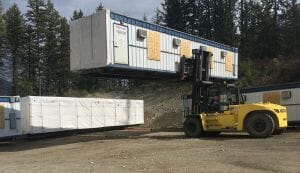MBI Opposes Oregon House Bill 2688A
For over 40 years, Modular Building Institute (MBI) has been the leading voice for the modular building industry, representing over 600 modular builders, designers, and suppliers throughout the United States and across the globe. Our members in Oregon include women-owned businesses that can complete public works projects faster and in a more environmentally conscious way than traditional construction firms. We oppose Oregon House Bill 2688A and encourage all state legislators to vote against this bill.
House Bill 2688A is convoluted to the point that MBI and other policy experts are not certain if volumetric construction is covered under the parameters it sets out. Should BOLI determine that volumetric construction falls under this bill’s purview, the overhead costs for compliance would immediately eliminate Oregon-based modular businesses from bidding on public contracts. Yet out of state businesses, who fall outside of BOLI’s enforcement capabilities, may still be able to bid on these contracts without complying with the law.
Modular construction provides the opportunity to complete building projects faster, and with significantly less waste. These factors often lead to lower overall project cost than traditional construction.
Additionally, modular factory employees enjoy a number of benefits not found in traditional construction employment. Modular employees perform their duties indoors, away from most environmental hazards found on traditional construction sites. They also work regular full-time hours throughout the year, providing a healthy work life balance.
Should House Bill 2688A become law, building projects would increase in price, face longer completion timelines, and produce significantly more waste. The bill also incentivizes contract awards to out of state businesses who would not reinvest their earnings into the local Oregon economy. For all these reasons, we ask the Oregon state legislature to vote against House Bill 2688A.
More From MBI Government Affairs
MBI Secures NY Governor Veto On Bill Targeting Modular Industry
A large fleet owner member of MBI was recently delayed in Georgia due to the state’s confusion over the details of the International Building Code. According to the company’s regional general manager, “The feedback we got was, ‘Your plans are not up to date, you need to bring them up to code.’”
Here’s how MBI was able to correct the state’s misunderstanding.
Read Complete ArticleWhat is the Davis-Bacon Act and How Does it Affect Modular Construction?
Adopted in 1941, the Davis-Bacon Act was written long before the modular construction industry gained momentum. Now, the US Dept. of Labor is considering applying the law in ways that will seriously curtail the use of modular construction for federal and state projects.
Read Complete ArticleMBI Solves Relocatable Building Code Issues in Atlanta
A large fleet owner member of MBI was recently delayed in Georgia due to the state’s confusion over the details of the International Building Code. According to the company’s regional general manager, “The feedback we got was, ‘Your plans are not up to date, you need to bring them up to code.’”
Here’s how MBI was able to correct the state’s misunderstanding.
Read Complete ArticleMBI Helps Kick-Start Stalled Plan Review Process
Modular projects in Washington State had ground to a halt. Plan review lead times began stretching into six, eight, even twelve weeks. “Over the summer of 2021, it was getting even longer than that,” says Alan Rasmussen of Modern Building Systems. “By the fall and winter of 2021, reviews were taking 24 weeks.”
Here’s how MBI was able to get things moving again.
Read Complete Article- « Previous
- 1
- 2
- 3
- 4
- Next »




